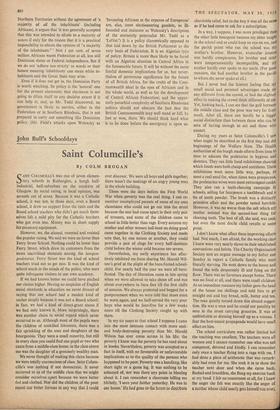Northern Territories without the agreement of 'a majority of all
the inhabitants' (including Africans), it argues that 'it was generally accepted that this was intended to allude to a majority of voters if only for the reason that it is a practical impossibility to obtain the opinion of "a majority of the inhabitants."' Not 1 per cent. of seven- million Africans wants Federation at all, less still Dominion status or Federal independence. But if we do not 'adhere too strictly' to words or their honest meaning 'inhabitants' can mean white in- habitants and the Great State may arise.
Even if it does not get in, the Dominion Party is worth watching. Its policy is the 'natural' one for the present electorate; that electorate is not going to dilute itself to any decisive extent if it can help it; and, as Mr. Todd discovered, no government is likely to survive, either in the Federation or in Southern Rhodesia, tliat is not prepared to carry out something like Dominion policy. (Mr. Field's attacks upon Welensky as 'favouring Africans at the expense of Europeans' are, alas, mere electioneering gambits, as ill- founded and insincere- as Welensky's description of the eminently paternalist Mr. Todd as a 'Leftist.') It is a policy diametrically opposed to that laid down by the British Parliament as the very basis of Federation. It is an Algerian type of policy. Britain is more'than likely to be faced with an Algerian situation in Central Africa in the foreseeable future. It will be without the same fateful domestic implications for us, but never- theless of portentous significance for the future of all British Africa, for the credit of the Com- monwealth ideal in the eyes of Africans and in the whole world, as well as for the development of Central African Federation; and the appar- ently parochial complexity of Southern Rhodesian politics should not obscure the fact that the British Commonwealth may well stand or fall. b3 lost or won, there. We should think hard what is to be done before the emergency is upon us.












































 Previous page
Previous page